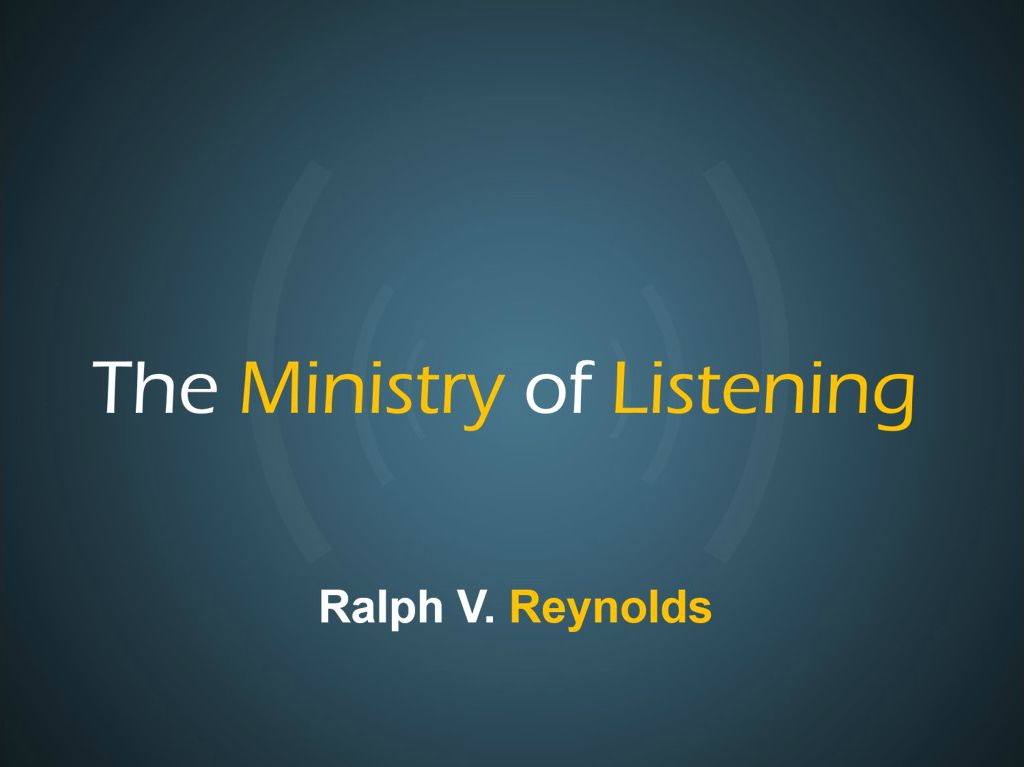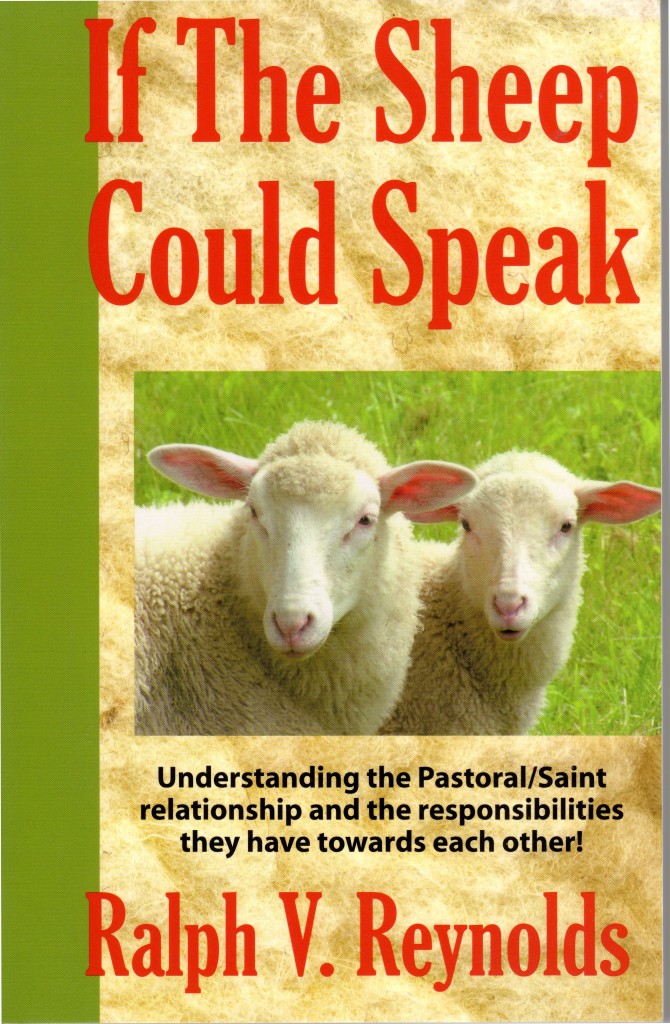
By Ralph V. Reynolds
“But be gentle with all men, apt to teach, patient, in meekness instructing those that oppose themselves. . .” (II Timothy 2:24-25).
One evening as I lay upon a hospital bed in Penticton, British Columbia, the cancer specialist came to my bedside and began to give me some instructions. As he talked I tried to enter into the conversation. The doctor very abruptly said, “I am doing the talking, and you are doing the listening.” After this rebuke, I allowed him to do so.
The sheep know their shepherd’s voice. It is the shepherd who talks and the sheep that listen. Are the sheep never allowed to talk? Certainly, there is a time when they can do so and upon such occasions, the shepherd listens. Chiefly, it is in counseling sessions that the sheep do the speaking.
People are human beings and battle with loneliness, discouragement, heartache and fear. Each person is an individual with his own problems and fears. He needs to have his problems solves with his burden lifted. However, before the pastor can minister to him, he must understand the problems that need to be solved. This can never be done successfully without the ministry of listening.
We must never treat lightly the problem of the saint who needs help. I have often listened to problems being expressed and confessed that they seemed trivial. They were so insignificant that I could have laughed at the thought that they were being considered as problems. However, the thing that always must be remembered is that although they seemed small to me, they were no small problem to the person who was burdened down with them. To the bleeding sheep, the matter was significant, and the sheep was hurting.
Counseling is time consuming. Many hours may be spent in the ministry of listening. Although it may take much time, the time may be invested most effectively. In the counseling session, the hurting and bleeding sheep may be helped more than at any time.
Upon more than one occasion I have patiently listened to saints who have confided in me their problems and troubles. At the close, I might give them a few words of advice and a word of prayer. They leave with a hearty handshake saying, “Pastor, you have been such a blessing to me. You have really helped.” Actually, I have said very little. All that I had done was listen to them as they poured out their hearts. However, as they talked and confided in me, it was marvelous therapy. Their wounds were being healed as they unloaded their burdens.
Before souls can be won, they first must be reached. Souls are won on a one to one basis. They go to church and listen to their minister because they feel that their minister cares for them. He proves that he cares by patiently listening to them when they come with problems. He has the ability to help because he has built confidence. The confidence and trust earned allows him to communicate. Communication is not just a one-way street. To communicate, a minister must be able to both talk and listen.
The shepherd who listens must never be surprised at what he hears. Sometimes, he may be shocked, but he must never let it be seen. He must never be critical or cynical. Patiently with loving understanding he listens. Then he counsels always with the welfare of the Christian at heart.
The shepherd who listens must always remember that the one who is confiding and confessing to him in doing so because he has confidence in him. That confidence must never be betrayed.
A young sister confessed to her pastor of a besetting sin in her life. She was battling with a habit that was bringing guilt into her life. The pastor made a joke of it and spread the story throughout the church. It can be understood why the girl left the church, never to return. Such betrayal of confidence is tragic and unworthy of any true man of God.
May the sheep speak? Certainly! However, they should never speak in rebellion or in criticism of their shepherd. Sheep must never speak to sow seeds of discord and dissension in the flock. When they are guilty of such action, they must be firmly disciplined and silenced. God has stated that He hates the person who sows discord among the brethren (Proverbs 6:19).
There are many reasons why it is profitable for the shepherd to listen to the sheep occasionally:
- The shepherd by listening is able to discern the spiritual welfare of each one and is then able to minister effectively according to the need.
- The shepherd is able to discover the potential ability in each member of the flock. When he knows their interest, burden and ability, he can harness it for the up building of the kingdom of God.
2 .Not only does the shepherd become acquainted with the spiritual needs of each member, he becomes aware of any problems within the body itself. He is able then to deal with anything that is festering before it develops into a major problem.
3 .By having the privilege of speaking, the laymen may be able to contribute much to the church. Many laymen have much to offer in the way of business, administration and building ability. These talents must never be disregarded but used for the work of God. If the shepherd never listens to the sheep, he may be wholly unaware of the great contribution that can be made to the work of God.
- Sometimes the sheep can even teach their minister deep truths. Every teacher must be willing to be taught. Anyone who is unteachable disqualifies himself from being a teacher. Let me illustrate this from my own experience.
I began preaching the gospel in the fall of 1936. At that time, I did not believe the new birth message. I preached that everyone who believed was ready for the rapture of the church.
During the war years, I pastored a large country church in eastern Ontario. This church was one of the oldest churches in Canada. I had in this church precious saints who had the Holy Ghost more years than I was of age. One morning, I was teaching the Bible class, and the question of the wedding garment came up. We entered into considerable discussion regarding who was ready for the coming of the Lord. I told them that every believer was ready. They did not refute me, but they gently and lovingly began to ask questions and quote Scripture. They slowly and gently backed me up into a corner where I knew that I had no further answer. I went home determined to find out what the Word of God had to say. I went through the entire New Testament and wrote out in my own handwriting every verse of Scripture that was dealing with salvation. When I finished, I changed my doctrine. God gave me that day a revelation regarding the new birth. Since then, my Bible teaching regarding the new birth has been circulated around the world.
Many times I have thanked God that on that Sunday morning I had listened to the voice of the sheep. If I had quenched their voice and silenced them, God could never have led me on into deeper truth.
- By listening to the sheep, a good relationship between the pastor and the church members can be developed and maintained. This is also true in the home and family. When major decisions should be made, it is wisdom on the part of the father to allow each member of the family to speak and to give their thoughts concerning the matter. It might be regarding where they are going to go on the summer vacation. Mother has a preference and the children do also. The father allows them to voice their opinion. But when it is finished, the father makes the decision, and the whole family rallies around the decision that he makes. So it is in the church family.
There is no harm done in allowing the sheep to speak if they do not do it to contradict or rebel against their pastor. The pastor listens and then makes the decision. After the shepherd makes it, then the entire flock rallies around that decision and unites to follow the leadership of the man of God whom God has placed over them.
There certainly is a time to speak, and there is a time to listen.
The above article “The Ministry of Listening” is written by Ralph V. Reynolds. This article was excerpted from chapter twelve in Reynolds’s book If The Sheep Could Speak.
The material is copyrighted and should not be repainted under any other name or author. However, this material may freely be used for personal study or purposes.




1 thought on “The Ministry of Listening”
Comments are closed.